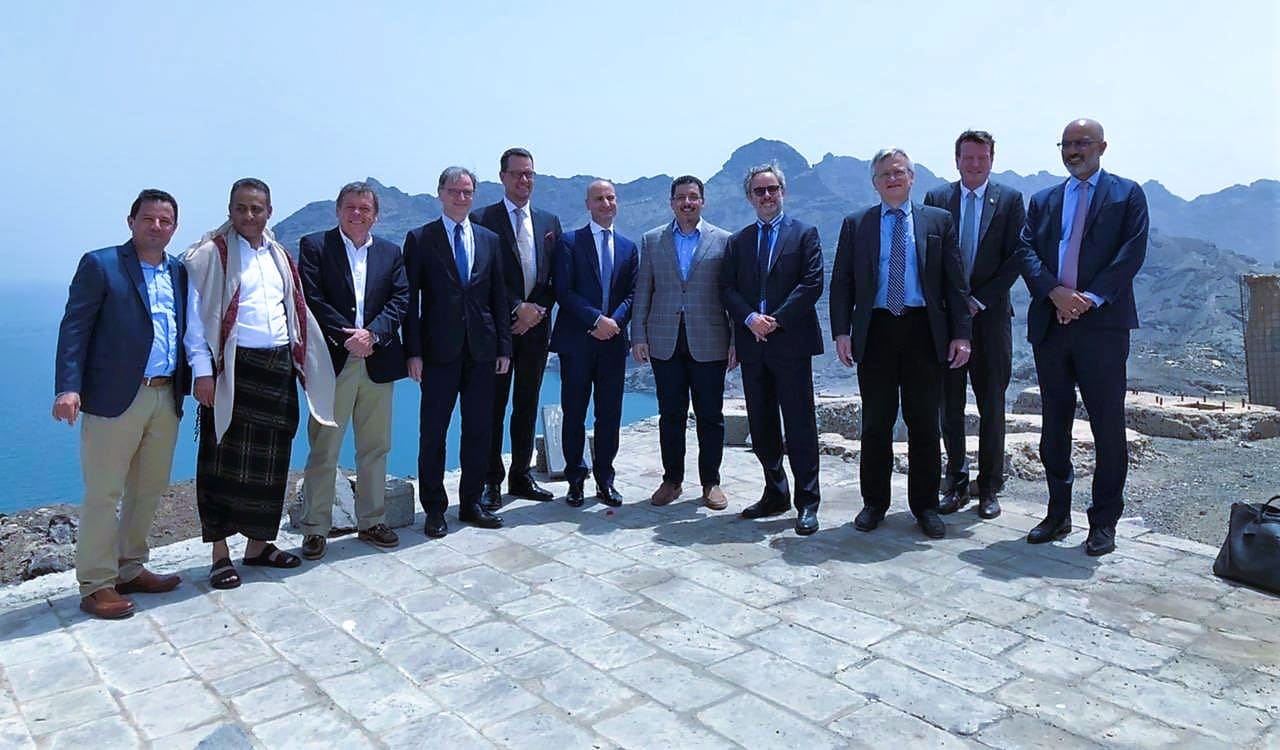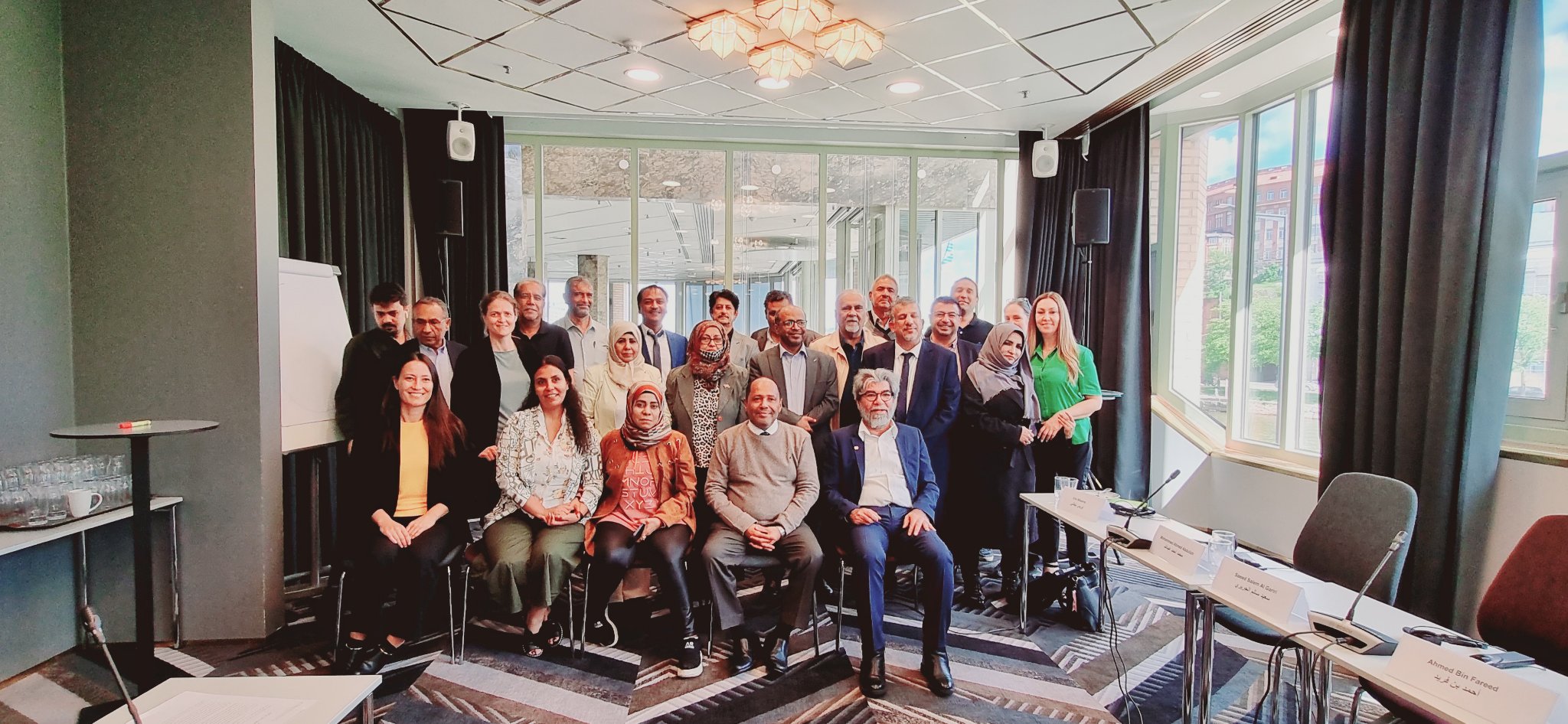
European ambassadors during a visit to Aden at the Ma'ashiq Palace in Crater, June 2, 2022 (official)
Last updated on: 20-06-2022 at 6 PM Aden Time

Farida Ahmed (South24)
For the first time, the Finnish capital city of Helsinki hosted consultations of parties from South Yemen supervised by Martti Ahtisaari Peace Foundation (CMI). There is a remarkable shift in the policies adopted by some European institutes recently, especially as they used to play a semi-negative role towards Southerners based upon feedbacks they received from some other rival Yemeni parties claiming that the Southerners are not able to meet or reach consensus regarding South Yemen’s future in particular. Those institutions attempted to convey a gloomier picture about the situation there.
It is clear that the Finnish institute made an unprecedented European move that deserves to be applauded due to its importance in light of two factors: The first one is that it is the first time to invite Southerners alone without others since the 1994 War against South and its subsequent implications that led to the emergence of the Southern issue and the peaceful "Hirak. The second factor is to understand the changes on the ground to see the Southern political and military implications after 2015. In addition to realize the importance of finding out joint Southerns formulas and visions which has the same importance as finding points of consensus among the Yemeni forces before going to comprehensive peace.
Parallel to that, the European Institute of Peace sent many invitations to Southerners from every now and then to attend workshops during past years to support the civil society organizations and confront the challenges that face them for enhancing peace in Yemen. However, they failed to open Southern dialogues for presenting solutions which determine the future shape of the state. Therefore, it seems that the Finnish institute's move is an open and advanced step which could pave the way for other European organizations to provide sufficient space for Southerners and listening to their visions.
In fact, the STC, the most influential entity in South Yemen, sent a similar invitation in the middle of last year for an "Southern Dialogue" to reach joint working formulas and commonalities that determine the future of South Yemen. For that purpose, the STC established a special committee to communicate with different Southern leaders and factions, led by former Minister and the STC's Presidency Member Murad Al-Halmie along with the STC's official, Ahmed Omar Bin Farid who lives in Europe.
The designated Committee made dozens of meetings and brought closer the views of many Southern forces even those who don't fully agree with the STC's political approach. Despite the encouraging results of the Committee's work, it seems that there is still a need for diligent effort. It is remarkable that they benefited from the latest Riyadh Consultations in April for holding a number of visits and meetings with Southerners who existed there.
It is clear that the latest workshop in Finland tries to explore the Southern views about the expected form of the state along with setting perceptions and patterns for other countries that experienced local government. The workshop was not a negotiation framework to deliver political solutions according to Ahmed Bin Farid on his Twitter account [1]. He is one of those invited to participate in the workshop. This could contribute in enhancing their dialogue with different Southern forces and finding a conciliatory formula about the form of the state in the future for sustainable peace in Yemen. Large percentage of the Southerners still sticks to the right to restore the South Yemen's state including prominent Southern entities and political parties.

A picture taken during the consultation meeting between the Southern parties and the workshop in Helsinki on June 15th 2022 (Twitter).
Before peace negotiations
It is important to say that the STC's insistence on arranging an intra-Southern dialogue before the beginning of comprehensive peace negotiation with other Yemeni forces is very important to form a compatible national front. This reflect the STC's openness view towards other parties in South although the STC has the strongest presence at political, popular and military levels. These attempts were clearer through the Southerners' insistence on the inclusion of the "Southern people issue" as part of the outputs of the Riyadh Consultations, sponsored by the GCC in last April to be among the negotiations to end the war in Yemen within a special frame.
Practically, Southerners believe that the "Southern dialogue", the beginning of discussing ready-made visions and solutions regarding the Southern future and presenting these solutions in the context of comprehensive peace negotiations are better than to be discussed later. This would encourage wasting time and could open the door for controversy and contradictions. Thus, an independent intra-Southern dialogue and an independent intra-Northern dialogue is a more practical and logical move before entering in a comprehensive dialogue between the Yemeni parties with all their tendencies to achieve peace in Yemen. Thus, it is important that these forces find more spaces and opportunities to listen and understand in light of the current political and military changes. The Southerners tried to express joint visions regarding the Southern issue in more than one occasion. Most of them tried to find fair drastic solutions for the Southern people after the failure of the Yemeni unity between South and North. It is not a sort of exaggeration to say that the international community dealt with the Yemeni crisis in the 1994 War as a de-facto matter. It had only expressed feelings of concern towards hurting innocent civilians blatantly throughout the UNSC Resolution (924) issued on June 1st 1994 [2]. With the ongoing suppression practices adopted by the former Yemeni regime against Southerners including killing, violence, arrest and plundering of Southern wealth. This gradually led to the Southerners' entering a forced isolation which reduced their contacts with decision-making circles in the region and the international community, especially that the Saleh regime sought to use South to intimidate the West. In his era, extremist groups used to use areas in South to implement their terrorist operations.
Moreover, the attempt to enlarge the conflicts among the Southern political entities while turning a blind eye towards the drastic conflicts among the Northern political and partisan entities carry much exaggeration in a way that contributes in the West's rejection to deal with Southerners. It seems that some Western decision makers believe that dealing with Southerners requires giving them independence promises. Thus, some of them prefer not to deal with them directly. Although the Southerners seek for external backer who has more open view and is capable of reaching a better understanding of their visions and ideas to solve the Yemeni unity crisis, the ongoing neglect by the international community to these voices will necessarily lead to more waves of violence in Yemen.
The European stance towards the Southerners
The continuous prejudgments by some European countries and their active organizations about the Southerners along with the neglect of new facts on the ground make them late and less aware of the changes. This will impact their peace efforts in Yemen, especially that South Yemen became more coherent than ever in in several aspects aspects.
There has been a trouble regarding the European countries' reliance upon certain Yemeni centers and organizations through their active bodies and mechanisms to receive opinions and studies based on readings biased to non-Southern political parties. This made them undoubtedly take the side of these organizations. This problem stirred arguments among many Southerners about the lack of understanding the dimensions of the Yemeni unity crisis and its dynamics upon which it was based. The European decision makers have to provide suitable support and mechanisms to contain the basic issues in Yemen, foremost of which is the Southern issue including listening to its entities as well as political, military and social elites.
It should be said the European role in supporting the Southerners is very little and limited. It depends as a whole on the visions of Yemeni organizations and elites which adopt prejudiced and rigid positions towards South. On the other hand, it depends on the ideas of figures who have no political projects or direct impact on the scene and decision makers. Thus, it is not a surprise to witness a kind of bias in some Western positions or a sort of an alignment to some Yemeni organizations with which there are common interests. For example, the Yemeni Central Bank issued a statement in which it denounced the accusations against its leaders of trying to move the bank to Sanaa [3]. This pushed the EU's Mission in Yemen to write a tweet in which it expressed feelings of concern towards the campaign against the Central Bank [4]. Likewise, the US, the UK and France demanded the need to respect the bank's sovereignty.
This response came in light of the STC' statement days earlier in which it stressed the importance and the symbolic presence of the Central Bank as a sovereign state institution, and that touching it or moving its jobs fully or partially away from the internationally-recognized capital city of Aden violate the state sovereignty. The statement accused dubious elements in the bank's administration of trying to move the bank to areas under the Houthis' control [5]. However, Southern activists argued that the subsequent Western statements were somewhat biased and didn't provide the other side the opportunity to express its opinion about the reasons behind this statement. They said that Yemeni parties which quickly sought to extract European stances likely have preconceived intentions to move the Central Bank and they attempt to weaken the STC's political stance before the beginning of discussing moving the bank to Sanaa as part of the conditions the Houthis seek to impose for their own interests.
The employment of the term “respecting the Central Bank sovereignty" to affect the European stance towards this issue was misleading. The STC didn't touch the sovereignty of the bank's monetary policy and didn't even point to it. The statement just indicated that parties inside the bank (not the bank itself) try to exploit their job to facilitate reaching a de-facto political situation to surrender to the Houthi pressures for moving the main headquarters from Aden to Sanaa. This decision is of course beyond the bank's powers as it is a sovereign political decision which exceeds any powers constitutionally and legally granted to the bank that has only the authorities to manage the monetary policy. This sovereignty requires not allowing any acts by the bank's staff that could serve the interests certain political parties or to insert the bank in the peace, war and political settlement issues as shown in the STC's statement.
Naturally, we can understand the European attempts and peace solutions efforts in Yemen from a perspective that most of them focus on secondary issues at the expense of essential and fundamental ones. Directing attention towards the full picture of the troubled scene as well as its reasons and roots along with providing financial and strategic support for the Southern parties directly and not via Yemeni mediation channels would contribute in paving proper circumstances for a sustainable peace in Yemen. Furthermore, enhancing the European organizations' support of the dialogue with the Southerners along with wider understanding of the dimensions of their solutions regarding the Yemeni crisis since the Unity Agreement will create a sort of balance among the Yemeni parties and guarantee that everyone will have fair understanding and listening.
[1] A tweet by STC's official Ahmed Omar Bin Farid, June 16th 2022 (Twitter)
[2] Resolution 924 (1994) / (un.org)
[3] A press statement issued by the Yemeni Central Bank. (cby-ye.com)
[4] A tweet by the EU's Mission in Yemen, June16th 2022 (Twitter)
[5] The STC’s Presidency stresses its categorical refusal of any miserable attempts that target the Central Bank in the capital city of Aden. (stcaden.com)
Previous article